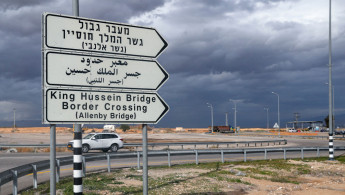More than 10,000 Palestinians trapped after being hit by Israel's arbitrary travel bans in 2021
Israel slapped travel bans on more than 10,000 Palestinians from the West Bank last year, according to a freedom of information request seen by Haaretz, measures deemed arbitrary and unfair by human rights groups.
Information released by the Israeli Civil Administration show that 10,594 Palestinians were prevented from travelling abroad due to "security reasons". Those affected were often unaware of the restrictions until they attempted to leave the occupied West Bank and many found the bans to be totally arbitrary.
This figure does not account for Palestinians who travelled to the border between the occupied West Bank and Israel but were denied passage by Israeli authorities who control the Allenby Bridge crossing.
The scale of the travel bans imposed by Israel came to light following a freedom of information request by HaMoked - Center for the Defence of the Individual.
"At any given moment, there are more than 10,000 people on the Shin Bet's blacklist, which prevents them from leaving the West Bank to travel abroad,” Jessica Montel, executive deputy director of HaMoked told Haaretz.
"This is without any prior notice, explanation, or hearing. For the most part, the reason is only revealed when someone turns up at the Allenby Bridge, with a suitcase and a flight ticket they have purchased on their way to visit family, to study, work, or for medical treatment."
Palestinians who wish to travel abroad use the Allenby Bridge border point to reach an airport in Jordan, but access to the crossing is controlled by Israel.
Israel enforces strict measures on Palestinians wishing to enter 1948 territories, while restrictions for those leaving Gaza are even stricter.
According to an anonymous source who spoke to Haaretz, travel bans are often applied automatically. This can happen to those who are related to individuals who are accused of terrorism.
If an individual becomes aware of a travel ban, an appeal can be made to have it lifted.
Data from the Civil Administration revealed that in 2021, 339 appeals against travel bans were submitted, with 143 being granted, which alludes to the arbitrary nature of the travel bans.
In the instance where an appeal is denied, sweeping statements, such as "You are a Hamas activist" are enough to ensure the ban stays in place, according to Haaretz.
Appeals against travel bans must be responded to by the Civil Administration within eight weeks.
In their work, HaMoked has highlighted numerous cases of travel restrictions applied to Palestinians, including the 2019 case of a lecturer from Nablus, who was due to attend classes in Germany but discovered he was barred from travel after he arrived at Allenby Crossing.
He appealed the ban but received no response within the eight-week window, and the restrictions were then repealed.
In other cases, Palestinians who have been hit with travel bans could only have the decision repealed if they signed documents that promised they would "refrain from involvement in terrorism".
In one such instance, a Palestinian man, who was attempting to travel to Egypt to visit his brother who was in a hospital for cancer treatment was made to sign such a guarantee.
He was later forced to sign a further document that stated he would be subject to a permanent travel ban if he broke the terms of the first document.
"It is only at the bridge, when the army prevents them from leaving, that they discover that they have had a travel ban imposed against them," Montel explained.
"Over the years the centre has dealt with hundreds of such cases and in most of them, after reservations are submitted to the army, the ban is repealed and persons are free to travel. Thus, it is clear that this restriction – which severely harms the rights to freedom of movement - is imposed arbitrarily."





 Follow the Middle East's top stories in English at The New Arab on Google News
Follow the Middle East's top stories in English at The New Arab on Google News


